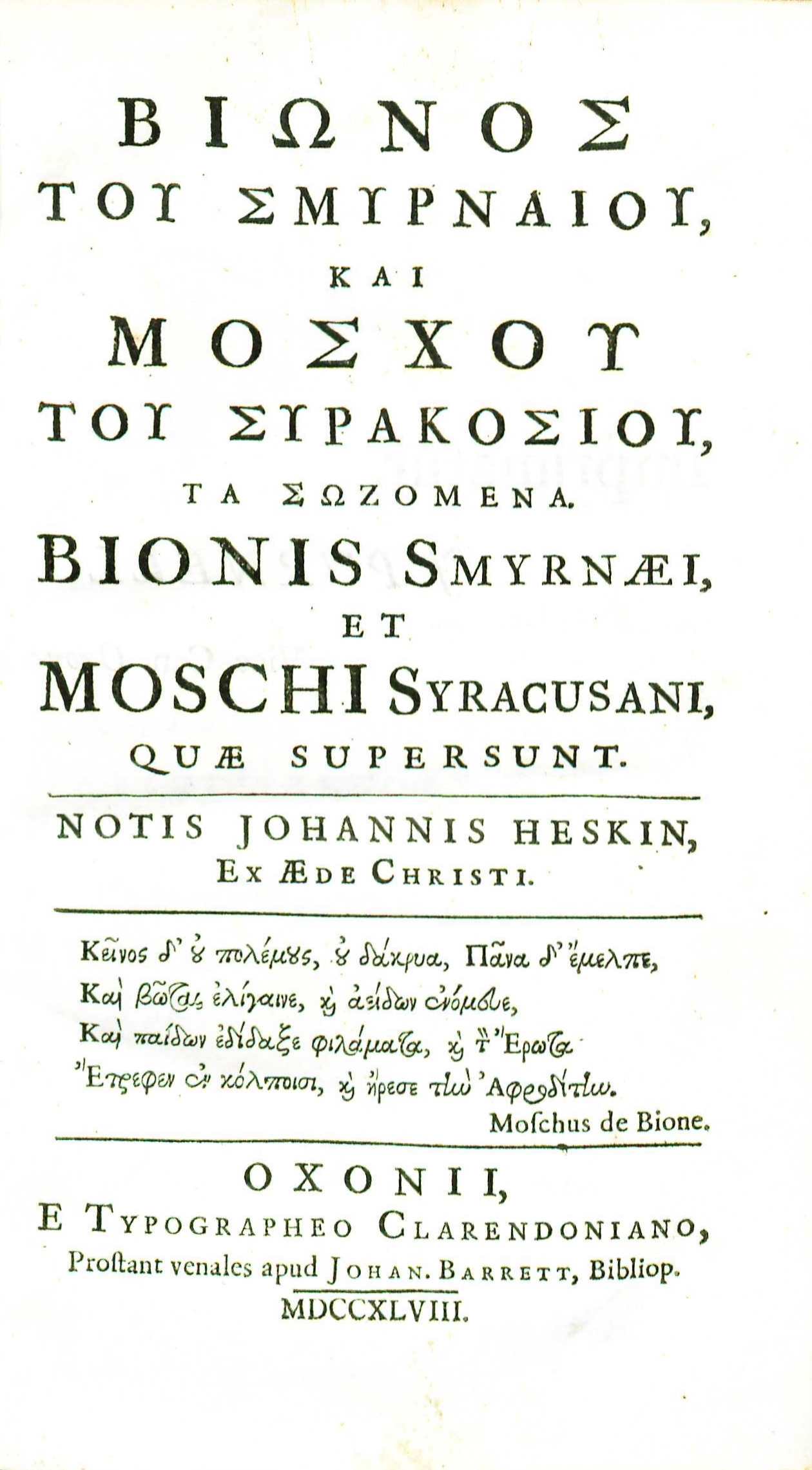Biōnos tou Smyrnaiou, kai Moschou tou Syrakosiou, ta Sōzomena = Bionis Smyrnæl, et Moschi Syracusani, quæ Supersunt
by Bion of Smyrna and Moschus of Syracuse
| Bionis Smyrnaei, et Moschi Syracusani, quae supersunt | |
|
Title page from Bionis Smyrnaei, et Moschi Syracusani, quae supersunt, George Wythe Collection, Wolf Law Library, College of William & Mary. | |
| Author | Bion of Smyrna and Moschus of Syracuse |
| Editor | Thomas Martin; notes by John Heskin |
| Translator | Adolf van Meetkercke (from Greek to Latin) |
| Published | Oxonii: e Typographeo Clarendoniano, prostant venales apud Johan. Barrett |
| Date | 1748 |
| Language | Greek and Latin |
| Pages | [9], 2-46,2-46, [3], 3-105, [1] |
| Desc. | 8vo (22 cm.) |
| Location | Shelf H-2 |
Bion of Smyrna (fl. c. 100 BC)[1] and Moschus of Syracuse (fl. c. 150 BC)[2] were minor Greek Bucolic (or pastoral) poets, and successors of the first Bucolic poet, Theocritus.[3] Little is known about either poet, and few of their works survive.
Most of what is known about Bion derives from the Lament for Bion, an elegy written by one of his students upon his death. Bion was born in Smyrna, now a part of Turkey, and lived in Sicily.[4] According to his student, he was poisoned to death.[5] Bion’s only surviving works are 17 fragments of poems from his Bucolica, and the Lament for Adonis, for which he is best known.[6] Though labeled a Bucolic poet, the “pastoral element in his work is slight.”[7]
Like Bion, Moschus is considered a Bucolic poet even though most of his surviving poetry is not pastoral in nature.[8] He was also a grammarian, though none of his works on grammar survive.[9] His extant works include five hexameter poems, an epigram on Eros as a ploughman, “a hexameter dialogue between Heracles’ wife [Megara]…and his mother Alcmena,”[10] and a longer poem entitled Love the Runaway.[11] Moschus is also the likely author of the short epic Europa.[12] Some scholars have attributed the Lament for Bion to Moschus, and consequently assumed he was a student of Bion’s and the third, rather than the second, of the Bucolic poets.[13] This attribution is now considered improbable.[14]
The 1748 Oxford edition of the surviving works of Bion and Moschus, edited by John Heskin, is considered a “very elegant edition.”[15] It includes a short preface and a note on the lives of Bion and Moschus, both in Latin, the poems in the original Greek with Latin translations on the facing pages, and extensive notes.
Evidence for Inclusion in Wythe's Library
Listed in the Jefferson Inventory of Wythe's Library as "Bion et Moschus. Gr. Lat. notis Heskin. 8vo." Thomas Jefferson kept this title and may have sold it to the Library of Congress in 1815.[16] Millicent Sowerby includes a copy of the 1748 Oxford edition of Biōnos tou Smyrnaiou, kai Moschou tou Syrakosiou, ta Sōzomena in her Catalogue of the Library of Thomas Jefferson. Unfortunately, Jefferson's copy no longer exists to verify the edition or Wythe's prior ownership. Both George Wythe's Library[17] on LibraryThing and the Brown Bibliography[18] list the 1748 edition. The Wolf Law Library followed the consensus and purchased a copy of the 1748 Oxford version.
Description of the Wolf Law Library's copy
Bound in contemporary speckled calf with a gilt, contrasting morocco lettering-piece. Purchased from Antiquates Ltd.
Images of the library's copy of this book are available on Flickr. View the record for this book in William & Mary's online catalog.
See also
References
- ↑ Encyclopaedia Britannica Online, s.v. "Bion," accessed June 5, 2015.
- ↑ Encyclopaedia Britannica Online, s.v. "Moschus," accessed June 5, 2015.
- ↑ "pastoral poetry," in The Oxford Companion to Classical Literature, ed. M.C. Howatson (Oxford: Oxford University Press, 2011), accessed June 5, 2015.
- ↑ Encyclopaedia Britannica Online, s.v. "Bion."
- ↑ J.M. Edmonds, trans., introduction to Greek Bucolic Poets, the Loeb Classical Library 28 (Cambridge, MA: Harvard University Press, 1912), xxiii.
- ↑ Encyclopaedia Britannica Online, s.v. "Bion."
- ↑ "Bion," in The Oxford Companion to Classical Literature, ed. M.C. Howatson (Oxford: Oxford University Press, 2011), accessed June 5, 2015.
- ↑ Edmonds, xxii.
- ↑ Encyclopaedia Britannica Online, s.v. "Moschus."
- ↑ "Moschus," in The Oxford Companion to Classical Literature, ed. M.C. Howatson (Oxford: Oxford University Press, 2011), accessed June 5, 2015.
- ↑ Encyclopaedia Britannica Online, s.v. "Moschus."
- ↑ Ibid.
- ↑ M.J. Chapman, ed., The Greek Pastoral Poets, Theocritus, Bion, and Moschus (London: James Frasier, 215 Regent Street, 1836), 406.
- ↑ "Moschus" in The Oxford Companion to Classical Literature.
- ↑ Thomas Frognall Dibdin, An Introduction to the Knowledge of Rare and Valuable Editions of the Greek and Latin Classics (London: Printed for W. Dwyer, 1804), 55.
- ↑ E. Millicent Sowerby, Catalogue of the Library of Thomas Jefferson, (Washington, D.C.: The Library of Congress, 1952-1959), 4:473 [no.4394].
- ↑ LibraryThing, s.v. "Member: George Wythe," accessed on August 11, 2015.
- ↑ Bennie Brown, "The Library of George Wythe of Williamsburg and Richmond," (unpublished manuscript, May, 2012, rev. May, 2014) Microsoft Word file. Earlier edition available at: https://digitalarchive.wm.edu/handle/10288/13433.
